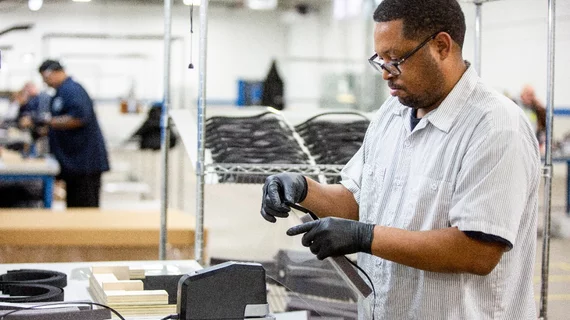Ford working with GE Healthcare, others to bolster PPE and additional supplies during pandemic
Ford Motor Company is partnering with imaging giant GE Healthcare and others in a bid to bolster critical supplies during the coronavirus pandemic.
The partnerships are aimed at addressing the availability of much-needed ventilators, respirators and face shields, essential to the treatment of coronavirus patients. Ford plans to provide its technical and production expertise in manufacturing to GE and 3M, the Michigan auto giant said Tuesday, allowing them to aggressively increase output.
Ford said its United States design team is already crafting and testing transparent, full-face shields for medical workers. One recent survey noted that a staggering 89% of medical practice leaders said they’re short of personal protective equipment during the pandemic, with radiologists and other providers imploring the feds for help.
The automaker’s shields fully block the entire face and eyes from accidental contact with liquids and, when paired with N95 respirators, may be more effective at limiting clinicians’ exposure to coronavirus than a respirator alone, according to an announcement.
“Working with 3M and GE, we have empowered our teams of engineers and designers to be scrappy and creative to quickly help scale up production of this vital equipment,” Jim Hackett, Ford’s president and CEO, said in a statement. “We are focusing our efforts to help increase the supply of respirators, face shields and ventilators that can help assist healthcare workers, first responders, critical workers as well as those who have been infected by the virus.”
Ford said its first 1,000 face shields are already being tested this week at Detroit hospital systems. Another 75,000 should be finished this week, with 100,000 pumped out at its facilities each week afterward.
Meanwhile, Ford is working with Chicago-based imaging giant GE to ramp up production of a simplified version of an existing ventilator model. Since the start of the pandemic, GE has already doubled its production of such devices and plans to double it again by the end of June in tandem with Ford Motor Company.
“We are encouraged by how quickly companies from across industries have mobilized to help address the growing challenge we collectively face from COVID-19,” GE Healthcare President and CEO Kieran Murphy said in a March 24 statement. “We are proud to bring our clinical and technical expertise to this collaboration with Ford, working together to serve unprecedented demand for this life-saving technology and support clinicians as they meet patient needs.”
Murphy shared last week that the Chicago-based company is also boosting production of its CT scanners, mobile x-ray systems and other imaging technology in response to “unprecedented demand” for medical equipment. The U.S. FDA also shared Tuesday that it’s taking action to address PPE supply shortages.
In addition, Ford said Tuesday that it’s working with 3M to increase production of powered air-purifying respirators for healthcare workers. The manufacturer said United Auto Workers are hoping to produce the new-generation devices at one of Ford’s Michigan facilities, “helping 3M boost production potentially tenfold.”

